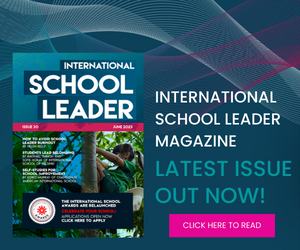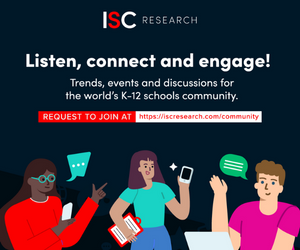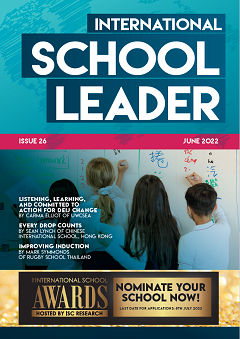By Robbie Shields
Being a teacher isn’t easy. Schools set high standards for educators to provide superb instruction and nurturing pastoral care, fully engage in campus life and communicate with many stakeholders. As such, it is essential for school leaders to prioritise faculty wellbeing. If our teachers aren’t at their best, then it will be impossible for them to bring their best to the classroom.
The importance of teacher wellbeing has been a topic of discussion for many years. In 2021, Tina Hascher and Jennifer Waber published an extensive review of research literature around teacher wellbeing, focusing on the period from 2000–2019. In this review, they spotlight the crucial need for teacher wellbeing by pointing out that positive teacher wellbeing directly impacts teacher effectiveness, student outcomes and educational governance. While this issue has been considered for a while, the onset of the COVID-19 pandemic in 2020 exacerbated (and many would say revealed) the importance of teacher wellbeing.
If teachers aren’t at their best, then it’s impossible for them to bring their best to the classroom.
The need to broaden teacher wellbeing
Pre-pandemic, when leadership looked at teachers’ wellbeing, two aspects were the main focus:
- Professional and personal development: Our school’s policy is very robust and even through the three years of the pandemic we didn’t stop providing these avenues for teachers
- A comprehensive financial package which is equivalent to industry standards
Undoubtedly these areas of teacher wellbeing are important, but when the pandemic began in Shanghai, our leadership realised that the strategy for teacher wellbeing needed to be more comprehensive.
To add context to our school environment, Qibao Dwight High School (QDHS) is the only independently run sino-US cooperative high school in China, and this unique cooperative status means that all school leadership and faculty operate in a complex and multicultural environment. During the last three years, we have experienced frequently changing government policies surrounding COVID-19, including strict building or city-wide lockdowns (in which people were not permitted to leave their apartments), long online learning periods and an inability for international faculty to travel back to their home countries. Many teachers faced feelings of fear and anxiety due to this uncertainty and an extended period of being unable to meet family and friends overseas.
With such a unique backdrop creating new challenges, we had to get creative in our offerings. We found inspiration for teacher support from outside traditional school models and implemented the following strategies based on feedback from teachers’ needs:
- Online and flexible access for our teachers to a social-emotional support counsellor
- Support from a nutritionist as many teachers were struggling with healthy eating during lockdowns
- Consultation from a financial adviser to help faculty understand and develop a personal financial plan for emergencies and long-term financial health
- Access to a career mentor who guided our school leaders in managing their teams through uncertain times
- Individual career coaching sessions which provided faculty with a more comprehensive understanding of how to manage various challenges in the workplace while also triggering career development possibilities for participating individuals. Through this process, teachers were equipped with skills that contributed towards delivering excellence in the classroom and helped to develop leadership and managerial skills needed for middle leadership. This benefit contributed to the refinement of our school-wide self-evaluation process, allowing us to better assess, evaluate and support each team member.
Feedback from staff informed us that this support structure was well received.
Wellbeing support that made a difference
No strategy received higher praise than the introduction of a social-emotional support counsellor. Managing lockdowns, separation from family, uncertainty surrounding issues related to everything from a fear of falling ill to pet care, this benefit proved to be widely popular. So much so, that after pandemic restrictions were lifted, we continued this support. Not every staff member has used it, but they all know it’s available should their needs change.
The subject of money and financial planning is one that is not openly discussed among teachers. Consequently, as school leaders, we were keen to bring this topic front and centre to destigmatise seeking help about financial planning.
How to expand wellbeing provision for teachers
- Ask, ask, ask! Teachers are your best input for what they need. Anonymously survey your community and have informal chat sessions or one-to-one meetings with team members and leaders to find out what they need. Alternatively, build a question into the self-evaluation such as, ‘What support might you need to most effectively execute your job?’.
- Think outside the box. Look beyond schools to other industries that are leaders in employee wellbeing for inspiration.
- Introduce easy wins. Some wellbeing initiatives can be easy to organise and communicate to everyone. For example, we introduced a weekly faculty snacks day when we bring different cuisines to the table and which are much looked forward to by our community.
- Make your wellbeing provision for staff visible and easy to access.
The benefits of incorporating such approaches in our school have been immense. Feedback from faculty has been overwhelmingly positive and this has trickled down to new team members.
As new faculty enter school, they are informed formally, and also informally through word of mouth from our teachers, that counsellors, financial advisers, career mentors and nutritionists are all part of the fabric of the school community. This builds an understanding that the school leadership genuinely cares about its people and works to support them.
From a development and management perspective, our approach has aspects that make it flexible and sustainable. By using external support providers who work on a contractual basis, we can develop our programming or make adaptations based on faculty needs with greater ease. This allows for a customisable approach that is dynamic with no impact on headcount and minimal impact on school budget resulting in a ‘win-win’ for teachers and leadership alike.
A direct result of expanding our wellbeing provision was a lower attrition rate amongst our international faculty during the difficult years of the pandemic which helped ensure stability at the school. With COVID restrictions now behind us, we’ve continued to look for opportunities to support our faculty’s needs. This has included offering discounted services to a fitness centre next to the school, and planning for the construction this summer of a teachers’ lounge with design input from staff.
Teachers are an essential part of the school community and their wellbeing should be a central focus for all leaders. For our school community, the pandemic shone a brighter light on this need.

Robbie Shields is American Principal at Shanghai Qibao Dwight High School, China. Connect with Robbie directly by email at [email protected]




